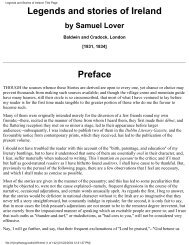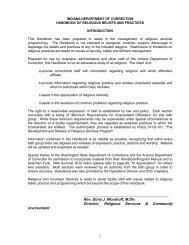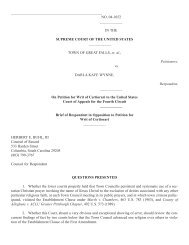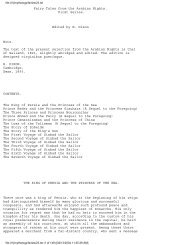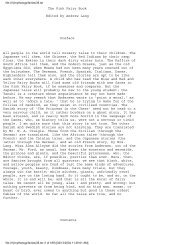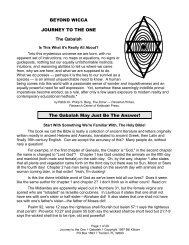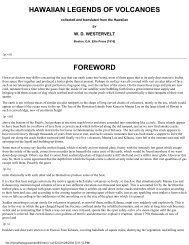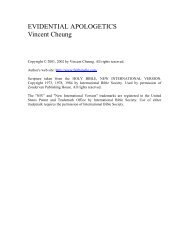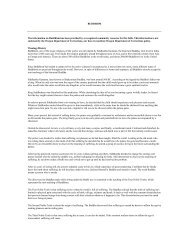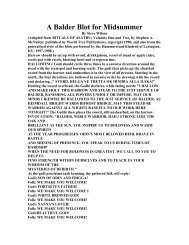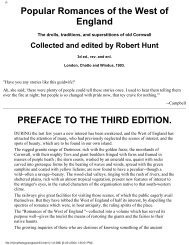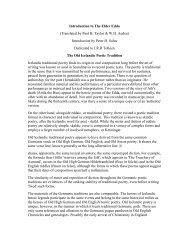You also want an ePaper? Increase the reach of your titles
YUMPU automatically turns print PDFs into web optimized ePapers that Google loves.
himself, as if waking from a dream, on the bank where he had seen the fair family amusing themselves. He turned towards home, but there<br />
he found everything changed: his parents were dead, his brothers could not recognize him, and his sweetheart was married to another man.<br />
In consequence of such changes he died broken-hearted in less than a week after coming back.'<br />
V.<br />
The Rev. O. Davies regarded the Llanllechid legend as so very like the one he got about Cwellyn Lake and the Waen Fawr, that he has not<br />
written the former out at length, but merely pointed out the following differences: (1) Instead of Cwellyn, the lake in the former is the pool<br />
of Corwrion, in the parish of Llandegai, near Bangor. (2) What the Lake Lady was struck with was<br />
p. 51<br />
not a bridle, but an iron fetter: the word used is llyfether, which probably means a long fetter connecting a forefoot and a hind-foot of a<br />
horse together. In Arfon, the word is applied also to a cord tying the two fore-feet together, but in Cardiganshire this would be called a<br />
hual, the other word, there pronounced llowethir, being confined to the long fetter. In books, the word is written llywethair, llefethair and<br />
llyffethair or llyffethar, which is possibly the pronunciation in parts of North Wales, especially Arfon. This is an interesting word, as it is<br />
no other than the English term 'long fetter,' borrowed into Welsh; as, in fact, it was also into Irish early enough to call for an article on it in<br />
Cormac's Irish Glossary, where langfiter is described as an English word for a fetter between the fore and the hind legs: in Anglo-Manx it<br />
is become lanketer. (3) The field in which they were trying to catch the horse is, in the Llanllechid version, specified as that called Maes<br />
Madog, at the foot of the Llefn. (4) When the fairy wife ran away, it was headlong into the pool of Corwrion, calling after her all her milch<br />
cows, and they followed her with the utmost readiness.<br />
Before going on to mention bits of information I have received from others about the Llanllechid legend, I think it best here to finish with<br />
the items given me by Mr. O. Davies, whom I cannot too cordially thank for his readiness to answer my questions. Among other things, he<br />
expresses himself to the following effect: 'It is to this day a tradition--and I have heard it a hundred times--that the dairy of Corwrion<br />
excelled all other dairies in those parts, that the milk was better and more plentiful, and that the cheese and butter were better there than in<br />
all the country round, the reason assigned being that the cattle on the farm of Corwrion had mixed with the breed belonging to the fairy,<br />
who<br />
p. 52<br />
had run away after being struck with the iron fetter. However that may be, I remember perfectly well the high terms of praise in which the<br />
cows of Corwrion used to be spoken of as being remarkable for their milk and the profit they yielded; and, when I was a boy, I used to<br />
hear people talk of Tarw Penwyn Corwrion, or "the White-headed Bull of Corwrion," as derived from the breed of cattle which had<br />
formed the fairy maiden's dowry.'<br />
My next informant is Mr. Hugh Derfel Hughes, of Pendinas, Llandegai 1, who has been kind enough to give me the version, of which I<br />
here give the substance in English, premising that Mr. Hughes says that he has lived about thirty-four years within a mile of the pool and<br />
farm house called Corwrion, and that he has refreshed his memory of the legend by questioning separately no less than three old people,<br />
who had been bred and born at or near that spot. He is a native of Merioneth, but has lived at Llandegai for the last thirty-seven years, his<br />
age now being sixty-six. I may add that Mr. Hughes is a local antiquary of great industry and zeal; and that he published a book on the<br />
antiquities of the district, under the title of Hynafiaethau Llandegai a Llanllechid, that is 'the Antiquities of Llandegai and Llanllechid'<br />
(Bethesda, 1866); but it is out of print, and I have had some trouble to procure a copy:--<br />
'In old times, when the fairies showed themselves much oftener to men than they do now, they made their home in the bottomless pool of<br />
Corwrion, in Upper Arllechwedd, in that wild portion of Gwynedd called<br />
p. 53<br />
<strong>Title</strong> <strong>Page</strong><br />
Arfon. On fine mornings in the month of June these diminutive and nimble folk might be seen in a regular line vigorously engaged in<br />
mowing hay, with their cattle in herds busily grazing in the fields near Corwrion. This was a sight which often met the eyes of the people<br />
on the sides of the hills around, even on Sundays; but when they hurried down to them they found the fields empty, with the sham<br />
workmen and their cows gone, all gone. At other times they might be heard hammering away like miners, shovelling rubbish aside, or<br />
emptying their carts of stones. At times they took to singing all the night long, greatly to the delight of the people about, who dearly loved<br />
to hear them; and, besides singing so charmingly, they sometimes formed into companies for dancing, and their movements were<br />
marvellously graceful and attractive. But it was not safe to go too near the lake late at night, for once a brave girl, who was troubled with<br />
toothache, got up at midnight and went to the brink of the water in search of the root of a plant that grows there full of the power to kill all<br />
pain in the teeth. But, as she was plucking up a bit of it, there burst on her ear, from the depths of the lake, such a shriek as drove her back<br />
into the house breathless with fear and trembling; but whether this was not the doing of a stray fairy, who had been frightened out of her<br />
wits at being suddenly overtaken by a damsel in her nightdress, or the ordinary fairy way of curing the toothache, tradition does not tell.<br />
For sometimes, at any rate, the fairies busied themselves in doing good to the men and women who were their neighbours, as when they<br />
tried to teach them to keep all promises and covenants to which they pledged themselves. A certain man and his wife, to whom they<br />
wished to teach this good habit, have never been forgotten. The husband had been behaving as<br />
file:///I|/mythology/celtic/26/26.html (36 of 237) [01/22/2004 12:42:26 PM]



